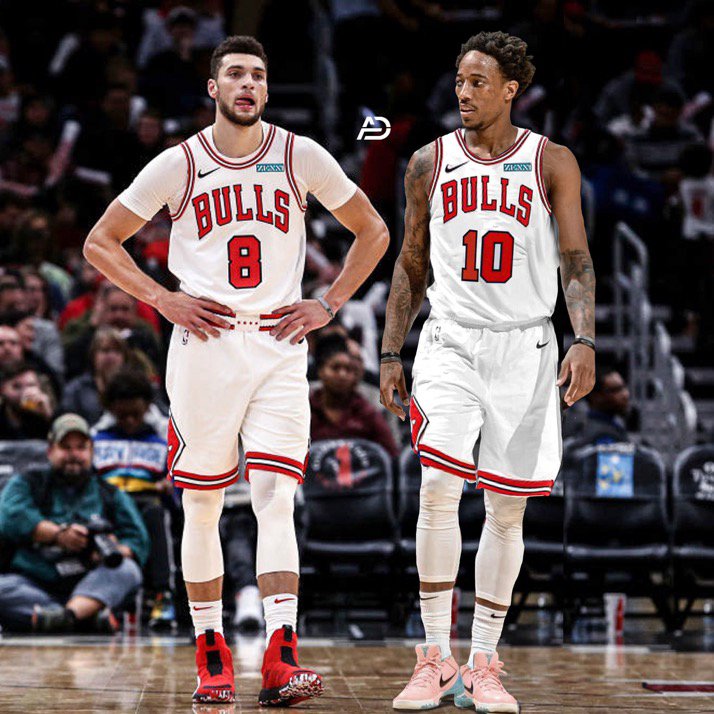
On the second day of NBA free agency, Arturas Karnisovas and the Chicago Bulls continued to make moves, agreeing to a sign-and-trade with the San Antonio Spurs for four-time All-Star DeMar DeRozan. The Bulls not only handed DeRozan a hefty contract but gave up significant assets to acquire him. Let’s break down the contract, the trade, and what this move means for the Bulls going forward.
The Contract
DeMar DeRozan will make $28M/year with the Bulls, putting him on par with players like De’Aaron Fox, Bam Adebayo, Donovan Mitchell, and Jayson Tatum. On an annual basis, he’ll be the highest-paid player on the Bulls roster (unless Zach LaVine signs a maximum contract extension). Those numbers can seem scary, especially when considering the fact that DeRozan will be 34 by the time the contract ends. However, he hasn’t shown any signs of decline, and his 6.9 assists per game was a career high, which shows that he may be aging gracefully. The deal may seem like an overpay, but in the NBA, teams often have to overpay for talent, and DeRozan is definitely a talented player.
The Trade
Two things that Shams didn’t note: (1) The Bulls also sent the Spurs Al-Farouq Aminu, and (2) the first-round pick is reportedly top-10 protected in 2025. That makes the trade a little more palatable. Still, giving up multiple picks and Thaddeus Young is a LOT for DeMar DeRozan. Young was one of the Bulls’ best players last season, and he was expected to be a major contributor for the Bulls off the bench. If the Bulls are good (which it looks like they will be), the picks won’t be all too valuable, but it’s still a lot of assets for a sign-and-trade.
Getting rid of Aminu’s contract is huge for the Bulls, however. Aminu and Young combined for a $24M cap hit this season, so with DeRozan’s cap hit at $27M this season, the Bulls are only adding $3M against the cap. Those savings are huge for a team that still needs to fill out the roster (6 open roster spots) despite being over the salary cap. Young’s abilities as a facilitator and defender will be sorely missed on the Bulls, but his contract expires after this season and, with the contracts currently on the books, it would’ve been hard to retain him anyway. The trade was an overpay, but it’s not the end of the world.
[embedyt] https://www.youtube.com/watch?v=hQYSnqjhGiY[/embedyt]DeMar DeRozan’s Fit with the Bulls: The Negatives
DeRozan’s primary purpose in the NBA has always been scoring. Over the past 8 seasons, he’s averaged 22.8 points per game. That’s not really something the Bulls need, as Zach LaVine and Nikola Vucevic 23 or more PPG this season. LaVine and DeRozan are both relatively ball-dominant, so head coach Billy Donovan will have to find a balance between the two that maximizes scoring efficiency.
In addition, DeRozan, LaVine, and Vucevic are all liabilities defensively, which could make the Bulls hard to watch when they don’t have possession of the ball. The Bulls’ defensive burden will have to be shouldered by Lonzo Ball and the 20-year-old Patrick Williams, which is far from an ideal situation.
DeMar DeRozan’s Fit with the Bulls: The Positives
DeRozan’s fit on the Bulls may be a little questionable, but despite the myriad of scorers already on the roster, it’s never a bad thing to have several players who can drop 20 points on any given night, especially if one of the Bulls’ “big three” gets hurt. As I said earlier, DeRozan averaged a career-high 6.9 assists per game last season, and he did that while only turning the ball over twice per game (that’s tied for the fourth-best mark of his career).
Ball movement was a big need for the Bulls last season, and this move further remedies that problem. Another big problem for the Bulls last season was an inability to get to the free-throw line, and DeRozan’s always been good at that, averaging 6.4 free throw attempts per game during his career. His 7.2 FTAs per game last season would’ve easily led the Bulls last season (LaVine was first on the team with 5.1 per game, and no other player currently on the roster averaged more than 2.1 attempts per game).

DeRozan took advantage of his free throws, shooting 88% from the charity stripe last season. The only current Bull who shot better than that last season was Coby White, who made 90% of his free throw attempts (weird, random fact: Denzel Valentine made 94% of his free throws last season!). DeMar’s positional versatility (he’s played SG, SF, and PF during his career) should let him fit easily into whatever lineups Billy Donovan uses.
DeRozan’s career 28% mark from three is, to be frank, atrocious. But the Bulls’ starting lineup has four good shooters. The other four projected starters for the Bulls (Lonzo Ball, Zach LaVine, Patrick Williams, and Nikola Vucevic) shot 37.8% or better from deep last season. The Bulls’ outside shooting should be able to create enough space for DeRozan to operate inside. While he won’t have the usage he’s had in Toronto and San Antonio, the Bulls are one of the best offensive situations DeRozan could have ended up in, as his strengths and weaknesses match up nicely with the rest of the roster.
Final Thoughts
Though the deal may seem like an overpay, DeMar DeRozan should be a valuable contributor to the Chicago Bulls. Besides his stats, he brings loads of playoff experience to the team, which is extremely valuable, especially when taking into consideration the fact that Nikola Vucevic is the only other Bulls starter who has logged playoff minutes. Finally, the DeRozan signing further signals that the new Bulls front office isn’t afraid to spend or make big moves, which is a welcome change from the previous regime. In all likelihood, the Bulls aren’t done making moves, and that’s something we can all be excited about.
